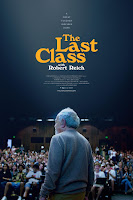July '25 Digital Week I
- Details
- Parent Category: Film and the Arts
- Category: Reviews
- Published on Thursday, 03 July 2025 02:45
- Written by Kevin Filipski
Sorry, Baby
(A24)
Eva Victor—whom I knew only from her tart turn as a young hot shot in the Showtime series Billions—has made a very auspicious triple-threat debut as a director, writer and actor in an often funny but also heartfelt exploration of how a graduate student turned professor named Agnes deals with being sexually assaulted by her thesis advisor.
Divided into sections that go back and forth in time, the film unfolds as an intentionally messy but intimate look into the head space of someone whose emotional trauma doesn’t define her but still holds a powerful grip. At times, Victor’s deadpan delivery, dialogue and direction threaten to derail her carefully thought-out drama, but she is such a winning performer that she keeps viewers enveloped in an awkward but affectionate hug like the one Agnes shares with neighbor-lover Gavin (a lovely turn by Lucas Hedges).
(Abramorama)
Elliot Kirschner’s fawning documentary follows Robert Reich—one-time U.S. secretary of labor and longtime professor of economics—as he prepares for his final class before retirement, having taught an estimated 40,000 students over his many-decade teaching career.
Kirschner mostly eschews politics to concentrate on Reich’s interactions with his students, which makes his 71-minute film often seem more a superficial glimpse at a “teacher of the year” instead of a deeper exploration of the complex legacy Reich leaves behind both in government and in academia.
A Minecraft Movie
(Warner Bros)
The special effects are the undeniable star of this bizarre, sporadically entertaining adaptation of the legendary video game; if director Jared Hess isn’t able to corral a game cast—with Jack Black at his scenery-chewing worst/best—into a cohesive ensemble, he does allow them to interact with the often arresting creatures conjured by visual effects maven Dan Lemon.
Five writers labored on the lame script, whose ending will undoubtedly allow a sequel to spring forth; there’s a first-rate UHD transfer that shows off this otherworld in its many details, and extras are several featurettes.
(Warner Bros)
When Mel Gibson and Danny Glover teamed up in this clunky 1987 buddy picture about antagonistic cops who improbably mesh together, no one would have guessed it would be a smash hit that spawned three enervating sequels.
By that metric, this first entry is the most watchable: Gibson and Glover have an undeniable chemistry, while director Richard Donner sets the comic repartee against the increasing—and unnecessarily violent—mayhem. Both the theatrical and director’s cuts are included; extras include a Donner appreciation by cast and crew along with a featurette on Glover and Gibson, the latter of whom tellingly isn’t part of the new interviews.
(Music Box)
As baseball movies go, Eephus doesn’t go for the mythmaking of Field of Dreams or sardonic humor of Bull Durham—rather, director/cowriter Carson Lund and cowriters Nate Fisher and Mike Basta tell an engagingly low-key story of amateur ballplayers playing one last game at the local ballfield before it’s scheduled to be bulldozed to make way for a new school.
The emphasis is on camaraderie and occasionally, flaring tempers—and if the movie at times is too meandering, it mirrors the characters’ sport of choice and is, finally, affecting in its slow-burn way. The film looks good on Blu; extras include commentaries, deleted scenes, blooper reel, interviews, a making-of and a dozen easter eggs.
(Dynamic)
The 75 or so operas of Gaetano Donizetti (1797-1848), highlighted by classics Lucia di Lammermoor, L’Elisir d’Amore and Anna Bolena, includes this 1822 opera seria about Zoraida, a woman betrothed to a tyrant, whose love for Abenamet—sentenced to death by the king—complicates things. The contrived opera clocks in at over three hours but has beautiful arias for its soloists.
Bruno Ravella’s production, seen at the Donizetti Opera Festival in Italy last November, comprises marvelous musicmaking from the orchestra and chorus under conductor Alberto Zanardi and chorus director Salvo Sgro, and the two lead roles are exquisitely sung by Zuzana Markova (Zoraida) and Cecilia Molinari (Abenamet). There are excellent hi-def video and audio.
Vainilla
(IndiePix)
Argentine writer-director-actress Valeria Rowinski plays Alma, in her mid-30s and who has never been fully satisfied by a man; her latest boyfriend is as much of a boor and bore as the rest. But after attending a party that allowed her to shed her inhibitions, she allows herself to more fully explore intimacy on her terms.
Although Rowinski is an engaging screen presence, her work as writer and director is less developed: Alma is not as interesting as Rowinski imagines her to be.
Bliss—The Composer Conducts
Poulenc Plays Poulenc and Satie
(Somm Recordings)
These valuable releases collect vintage recordings by two prominent 20th-century composers— Arthur Bliss (1891-1975) from England and Francis Poulenc (1891-1963) from France—that give another perspective on their artistry. In the two-disc Bliss set, the composer conducts several of his own works in performances from the 1960s, including BBC live broadcasts celebrating his 70th and 75th birthdays.
One of the more underrated of the crop of British composers that included Malcolm Arnold, Arnold Bax, Edmund Rubbra and Alan Rawsthorne, Bliss wrote varied and significant music in several genres, represented here by his vividly realized A Colour Symphony, the monumental oratorio Morning Heroes, his B-flat piano concerto (played brilliantly by John Ogdon) and his Concerto for Two Pianos.
Poulenc was an expert pianist, and in this recording, he not only plays the solo parts in his own concerto for two pianos (with Jacques Fevier) and Aubade but also several of his eloquent solo keyboard works including Suite Francaise. As a sweetener, Poulenc also plays several piano pieces by his compatriot, Erik Satie, celebrating Satie’s experimental composing style in his Gymnopedie No. 1, Sarabande No. 2 and Gnossienne No. 3.
Although the bulk of both recordings are in mono (one Bliss piece is in stereo), everything sounds immediate and vivid, even the Poulenc recordings from 1930 and 1950.









